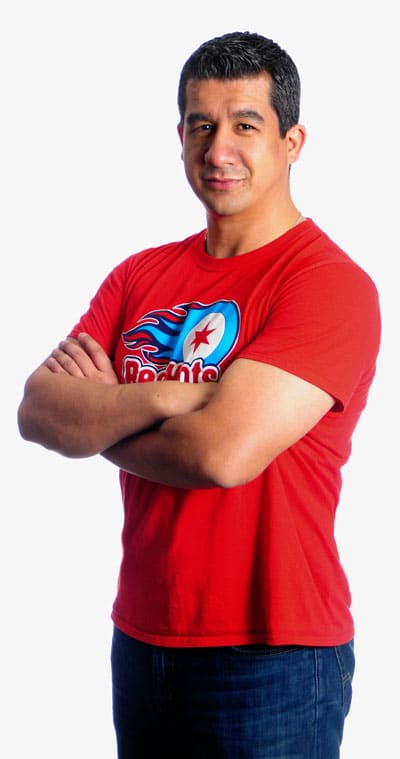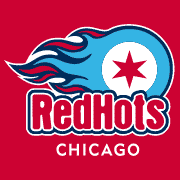Interview with Fernando Regueiro, Roller Derby Committee Chairman
Fernando Regueiro has been involved in Roller Derby for almost ten years. He was appointed to become Roller Derby Committee Chairman. Interview...
Par alfathor
Interview
Hello Mr Regueiro, can you introduce yourself?
 My name is Fernando Regueiro and I was recently appointed as the Chair of the FIRS Roller Derby Technical Committee. I have been involved in roller derby for more than ten years, working directly with athletes, officials and leagues. I have worked with the United States Federation as part of the Sport Committee for the last four years and as part of their Board of Directors for the last two years. I was Chair of the Committee for two years and was integral in the development of their Roller Derby program and every one of their National Championships.
My name is Fernando Regueiro and I was recently appointed as the Chair of the FIRS Roller Derby Technical Committee. I have been involved in roller derby for more than ten years, working directly with athletes, officials and leagues. I have worked with the United States Federation as part of the Sport Committee for the last four years and as part of their Board of Directors for the last two years. I was Chair of the Committee for two years and was integral in the development of their Roller Derby program and every one of their National Championships.
I am also the General Manager of the Chicago Red Hots, a club at the forefront of the movement to integrate widely-accepted sports organizational structures into roller derby. Before that, I led the Events Committee and was in the Board of Directors of the Windy City Rollers, one of the leading teams in the resurgence of the sport.
How did you start skating?
I do not skate competitively but my passion for roller derby and skating as a sport lies in the organizational side of things. I have years of experience in sports marketing, branding, event organization and promotion. I also have a first-hand understanding of the traditional sport structures and the benefits that a sport can get from such structures.
What brings you to Roller Derby?
More than 10 years ago, my wife Dakota (Kola Loka) and I attended one of the first roller derby games in Chicago, where we saw the Windy City Rollers home teams face each other. She joined shortly after and has been playing at the highest levels ever since, including participating in 4 WFTDA National Championships and 3 USARS National Championships. Since she joined, I have been involved in the organization of teams, committees, boards, events and everything else I can do to help.
Did you practice any other skating sport?
Not competitively. Many years ago I played professional football (soccer) in México for a few years and that experience definitely has influenced my perspective of what roller derby can be.
First you were in a WFTDA league, then you joined a USARS league, what is the difference?
I enjoyed my years with the Windy City Rollers. When I started, the WFTDA was not even formed but there was the ULC. The original meeting to form WFTDA was in Chicago back in the day and we were one of the founding member leagues. We also were one of the pilot leagues for the WFTDA insurance program when I was on the Board and we organized the 2010 WFTDA National Championship in Chicago. Basically, we grew as a league together with WFTDA. Based on all these years of experience, I have enormous respect for both organizations and for what they have done for the sport. I am grateful and I learned a lot from those years.
Unfortunately, my last years at Windy City were difficult due to the direct relationship we observed between the slow style of play and our fan retention. Some of us tried to emphasize the importance of the fan experience, but we had little success. In the meantime, our fanbase dropped from 4,500 to 500 people and our revenue plummeted. That is when three of us decided to create the Chicago Red Hots.
In terms of the differences, in addition to playing the USARS rules, which are very fan-oriented, we decided to start with a blank slate and challenge every concept behind the traditional roller derby “leagues” while using all of our previous experience to improve the processes. Our focus internally is on treating the athletes as athletes. We do not have committees, volunteering hours, street-teaming or even attendance requirements. Our players simply come to practice and play, nothing else. The Head Coach is the head of the athletic side of our club and gets to decide who plays or not based on performance. I am the General Manager and I run the business side of the club. I have a team of professionals -not players- who run sponsorship, marketing and production, some of them operating on commission. They make decisions quickly and efficiently without votes or obstacles based on a strategic plan. We have owners/investors and operate as a for-profit, but all of our annual profit is reinvested back into the team by design. All of our members, which include players, officials, announcers and staff, get free tickets and 33% of the profits they generate. Our players make an average of $45 per game and some have made almost $400 during a single game.
 Externally, our number one priority is our fans. We focus on families and kids, offering free admission to all minors 17 years and younger, starting our games at 5:30pm and limiting our events to one game per evening so that families can go back home early. We have 4 junior elite players ranging from 14 to 18 years old, which are allowed under USARS to play with adults. This has not only developed them as players but also has helped our family-oriented message. We manage our brand diligently and have very strict guidelines to ensure consistency. With the exception of our physical trainers, we only accept cash and reject in-kind sponsorships in order to increase the perceived value of our brand. There are too many other differences to mention, but the concept is that the Chicago Red Hots club is designed after successful sport organizations where both the athletic and business areas are dedicated to excelling within their own expertise without mixing responsibilities.
Externally, our number one priority is our fans. We focus on families and kids, offering free admission to all minors 17 years and younger, starting our games at 5:30pm and limiting our events to one game per evening so that families can go back home early. We have 4 junior elite players ranging from 14 to 18 years old, which are allowed under USARS to play with adults. This has not only developed them as players but also has helped our family-oriented message. We manage our brand diligently and have very strict guidelines to ensure consistency. With the exception of our physical trainers, we only accept cash and reject in-kind sponsorships in order to increase the perceived value of our brand. There are too many other differences to mention, but the concept is that the Chicago Red Hots club is designed after successful sport organizations where both the athletic and business areas are dedicated to excelling within their own expertise without mixing responsibilities.
What are your relationships with WFTDA, which is considered as a reference in the World of Roller Derby?
As I mentioned, throughout my tenure with Windy City I had a lot of contact with WFTDA. My relationship with WFTDA as a member ended when their NDA document started to include clauses that specifically forbid the promotion of other “governing bodies”, which targeted the work I had recently started with USARS. As part of my role in USA Roller Sports, I have had some contact with the leadership of almost every roller derby organization out there, including the WFTDA.
As you know, WFTDA does not wish to cooperate with FIRS and tries to get the IOC recognition for Roller Derby. What do you think of this situation?
The decision was made by the WFTDA and I will leave it to others to analyze their reasons and their future objectives. However, I do think it is important to provide some context. The relationship between FIRS and the IOC is not based on a single sport, FIRS represents 10 separate disciplines under the umbrella of roller sports. They also have very close relationships with PASO, ARISF, SportAccord, the World Games Organization and several other sport groups. Disturbing that relationship and compromising the other 9 disciplines seems improbable, but it is definitely a decision that corresponds to the IOC. In the meantime, the only viable path for our sport to be represented in the Olympic, World, Pan-American, European and other continental Games, as well as in the World Roller Games, is through FIRS. This is the main reason I accepted the position.
Roller Derby is a female and feminist sport. Is that not a paradox to appoint a man at the head of the institution?
I think it is important for anyone involved in roller derby to honor and respect the work that has been done, primarily by women, to create the modern version of the game. It is undeniably an incredible achievement and something to be proud of.
At the same time, I also feel the responsibility to acknowledge and respect the female and male athletes who were part of previous iterations of the sport all the way back to 1935, as well as the enormous contributions that male and female officials, announcers and volunteers have made to support us in the last 13 years.
Throughout my career I have vehemently supported the feminist movement in roller derby and have participated exclusively in female-only teams, but the reality is that roller derby has organically developed to include all genders. Under that premise, I believe it is the responsibility of all of us in leadership to advocate fairly for all participants and promote the sport as a whole. A real paradox would be to talk about the growth of the sport in the direction of the IOC and the world of sports while preserving a single-gendered and exclusionary mindset.
In my role, I will promote unity, inclusion and collaboration within our community, not only when it comes to gender but also in terms of styles of play, track type, age, experience, skill level and everything else.
What are the goals of FIRS for Roller Derby?
FIRS, like every other international governing body under the International Olympic Committee, is interested in fostering the development and growth of the sport and in increasing the reach of roller derby on a global scale. One of the primary goals of the organization is for roller sports to achieve inclusion in the Olympic Games so that they can be showcased to the broadest possible audience.
Does FIRS wish to impose a rule standard ? If so, USARS, WFTDA or a new one?
 Many sports have rules for international competition that differ from those adopted by national or professional organizations. Some of the best examples are the IIHF and the NHL in hockey, or FIBA and the NBA in basketball. This may happen because of their different audiences, different philosophies or different needs. When athletes play in their national or professional leagues (NBA or NHL), they play under their specific rules, but when they participate in international or continental competitions, they switch to the International Rules (FIBA or IIHF). Transitioning between rules is not a problem for talented players and they typically require only a few practices to get used to the differences.
Many sports have rules for international competition that differ from those adopted by national or professional organizations. Some of the best examples are the IIHF and the NHL in hockey, or FIBA and the NBA in basketball. This may happen because of their different audiences, different philosophies or different needs. When athletes play in their national or professional leagues (NBA or NHL), they play under their specific rules, but when they participate in international or continental competitions, they switch to the International Rules (FIBA or IIHF). Transitioning between rules is not a problem for talented players and they typically require only a few practices to get used to the differences.
The most successful rules in terms of adoption are the FIFA rules for football (soccer), which are used by most of the national and professional leagues as well as for international tournaments. What is interesting is that the FIFA rules are not managed by FIFA, but instead are managed by an independent “guardian” organization called the International Football Association Board (IFAB). This Board defines the rules based on the safety of the participants and also the impact that the rules have to the fan experience.
FIRS, just like FIBA and the IIHF, will establish International Rules for use in official competitions under the Olympic Movement, including the rules for the 2017 World Roller Games. The long-term concept is to create an independent group of experts similar to IFAB to manage and maintain those rules.
Will roller-derby be part of the 2017 Roller Games ?
The 2017 World Roller Games in Nanjing, China represent a historic step for roller derby, being the first tournament recognized by FIRS that will include the sport and the first time roller derby will be presented together with all the other roller sports at an international event. Our objective is to make the Games as successful as possible for the fans and the athletes. With the event a year and a half away, we are contacting all the National Federations and offering them the opportunity to be one of 16 teams to participate in the event in both the women’s and the men’s categories.
If you wish to add something…
The 2017 World Roller Games in China will feature more than 6,000 athletes and coaches from over 100 participating nations in 10 roller disciplines. The event will see not only the massive presence of insiders of the Roller Sports world and the International Olympic Committee, but also more than 200,000 supporters and fans that will experience for 16 days the exciting atmosphere of a great celebration of sports and entertainment with global media coverage.
I would like to take this opportunity to encourage all the athletes who currently participate in national teams to take advantage of the incredible chance that we have to showcase our sport. Contact me through social media or at rollerderby@rollersports.org with any questions or comments.
